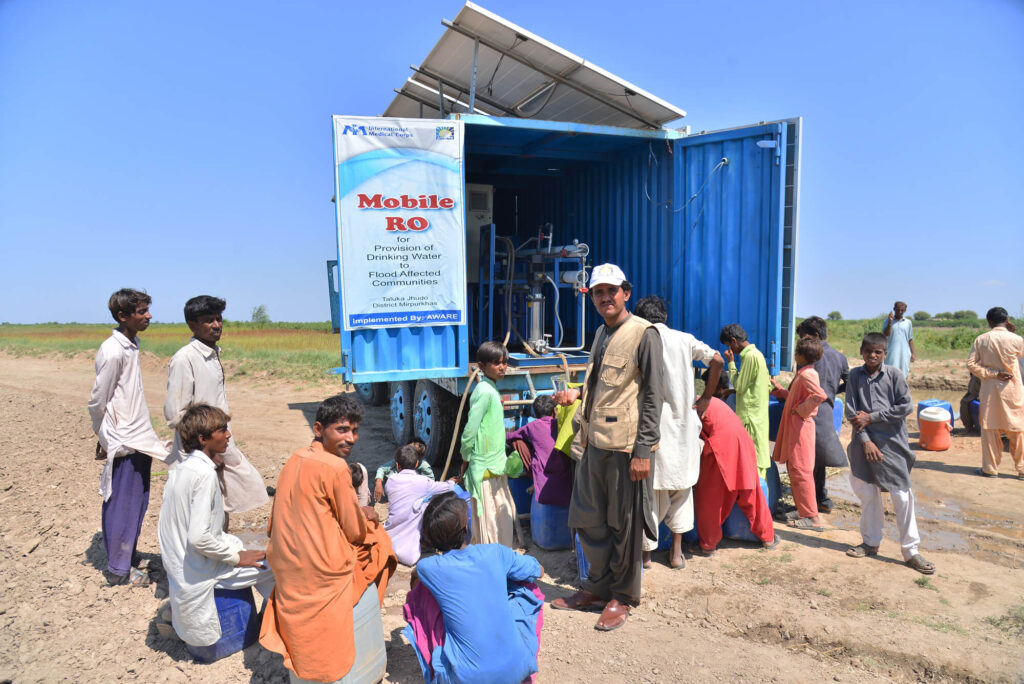Deadly monsoons that began in June have caused unprecedented flooding in Pakistan, leading to large-scale destruction, mainly in Sindh and Balochistan provinces. Many people in these provinces live in unsanitary conditions in temporary shelters, with limited access to essential services—including clean, safe drinking water.
International Medical Corps works with local partners worldwide to implement lifesaving programs. In Pakistan, we partner with the Association for Water, Applied Education and Renewable Energy (AWARE), a local emergency response nonprofit that focuses on providing clean water to remote communities. Together, we are helping people recover from the devastating floods.
Water, Water Everywhere…
Niyamat is a 43-year-old widow and mother of four. She lives in Nawaz Otho, a village in Sindh province, and works as a housemaid. Before the recent monsoons, she lived in a mud house. The flooding swept her house away, and now she and her children live in a makeshift, temporary shelter on the roadside—the only location in her community without floodwater.
The only source of fresh water in Niyamat’s village had been a canal. Unfortunately, the canal was contaminated due to flash flooding, which also destroyed the sanitation infrastructure. Stranded on the road, surrounded by floodwater, people in the community were initially forced to drink contaminated water, which can lead to infectious diseases, such as diarrhea and cholera.
“We used to fetch contaminated water from the canal,” says Niyamat. “The water was muddy and tasted sour, but we had no choice. We did not have access to clean water.”
International Medical Corps and our partner AWARE were able to change that.
“Our technical team visited the area and collected water samples from different water sources in flood-affected areas, including hand pumps, irrigation canals, water storage tanks and stagnant floodwater,” explains Ali Akbar, Chief Executive of AWARE. “The water was found unfit for human consumption, so AWARE asked International Medical Corps to help us come up with a solution.”
Clean Water on the Go
Working with AWARE, International Medical Corps supports a mobile, solar-powered reverse-osmosis (RO) plant that travels across Sindh province, purifying floodwater and converting it into safe drinking water.
The RO plant was installed in the body of a truck that can easily navigate challenging roads, reaching remote, flood-affected areas. The truck travels to camps for displaced people daily. Since it’s solar-powered, it operates during daylight, from 9:00 a.m. to 4:00 p.m.
“By partnering with AWARE, we are able to reach flood-affected communities throughout Sindh province and provide clean, safe water, reducing cases of infectious disease,” says Burhan Ullah, WASH Coordinator with International Medical Corps in Pakistan.
The RO plant can filter up to 6,000 gallons of water per day. The filtration system improves water’s taste, odor and appearance by removing contaminants and pollutants, including nitrates, pesticides, sulfates, bacteria and arsenic. It can also remove 95–99% of the dissolved solids in drinking water.
“Thanks to the new water system, we are no longer afraid to drink or cook with contaminated water. Our water is clean and safe,” says Niyamat. “Our community is very thankful to International Medical Corps and AWARE for their support during this challenging time. Before the flooding, I used to fetch water from far-flung areas with a pitcher on my head. It was a tiring chore that took an entire day. Having a safe water facility at our doorstep is much easier, especially when we are all stranded in temporary shelters surrounded by floodwaters.”
An estimated 5.5 million people in Pakistan can no longer access safe drinking water due to damaged infrastructure and facilities, and Sindh is one of the hardest-hit provinces. Through the mobile plant, International Medical Corps has supported the delivery of more than 71,000 liters of clean drinking water to flood-affected communities in Sindh—and is providing more every day.
